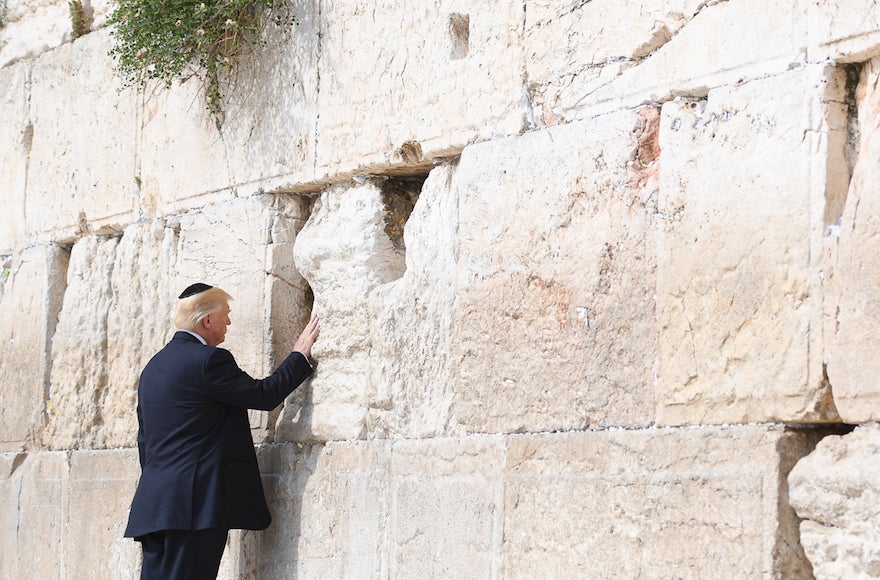(JTA) — President Donald Trump signed an order to renew the six-month waiver that allows the U.S. embassy to remain in Tel Aviv rather than moving it to Jerusalem.
As a candidate, Trump promised to move the embassy to Jerusalem, which was required by an act of Congress in 1995 but which successive administrations have delayed with a series of six-month waivers, citing national security concerns. The latest waiver, signed by Trump’s predecessor, Barack Obama, expired on Thursday.
Trump’s signing of the waiver was first reported Thursday morning by the New York Times, though there had been much speculation in political circles and in the media that he would do so.
“While President Donald J. Trump signed the waiver under the Jerusalem Embassy Act and delayed moving the U.S. Embassy in Israel from Tel Aviv to Jerusalem, no one should consider this step to be in any way a retreat from the President’s strong support for Israel and for the United States-Israel alliance,” the White House said in a statement announcing the signing of the waiver. “President Trump made this decision to maximize the chances of successfully negotiating a deal between Israel and the Palestinians, fulfilling his solemn obligation to defend America’s national security interests. But, as he has repeatedly stated his intention to move the embassy, the question is not if that move happens, but only when.”
Trump did not discuss the waiver publicly during his visit to Jerusalem late last month. He was, however, the first sitting president to visit the Western Wall. He has stated that he would like to broker the “ultimate deal,” a peace agreement between Israel and the Palestinians with the approval of the rest of the Arab world. He reportedly was convinced on his recent visit to Saudi Arabia and to the Palestinian Authority that moving the embassy at this time would imperil such a deal.
The United States, like most countries throughout the world, does not recognize Jerusalem as Israel’s capital. Israel calls all of Jerusalem its “undivided capital,” while the Palestinians consider eastern Jerusalem the capital of a future Palestinian state.
Israeli Prime Minister Benjamin Netanyahu in a statement issued by his office said that Israelis “disappointed” that the embassy will not move at this time.
“Israel’s consistent position is that the American embassy, like the embassies of all countries with whom we have diplomatic relations, should be in Jerusalem, our eternal capital,” the statement issued by the Prime Minister’s Office said. “Maintaining embassies outside the capital drives peace further away by helping keep alive the Palestinian fantasy that the Jewish people and the Jewish state have no connection to Jerusalem.”
“Though Israel is disappointed that the embassy will not move at this time, we appreciate today’s expression of President Trump’s friendship to Israel and his commitment to moving the embassy in the future,” the statement said.
J Street in a statement, welcomed Trump’s decision to sign the waiver, calling it “in keeping with 20 years of bipartisan policy” since the passage of the 1995 Jerusalem Embassy Act.
“J Street believes that Jerusalem is absolutely central to the history, culture and identity of the Jewish people. We look forward to it, one day, being recognized by the entire world as Israel’s capital, as part of a negotiated two-state solution,” the statement also said.
Jerusalem Mayor Nir Barkat said in a statement on President Trump’s decision to sign the waiver: “I regret President Trump’s decision to sign the waiver but am certain that he will keep his word and bring the US embassy to its rightful place – Jerusalem, the capital of Israel. I will continue to provide assistance to the US administration and do all I can to ensure that the relocation happens as soon as possible.”
Rep. Lee Zeldin, R- New York, a member of the House Foreign Affairs Committee and co-chairman of the House Republican Israel Caucus, said in a statement: “Jerusalem is absolutely where our embassy belongs. Jerusalem is the unquestionable capital of Israel and should be fully recognized as such. In addition to all of the most sacred religious sites, Jerusalem is also the location of the Israeli Knesset and offices and residences of the Israeli Prime Minister and President. I strongly urge the President to reconsider this most recent announcement. It was a credit to the President’s campaign last year that he knew and was outspoken for moving the U.S. embassy as the correct path forward.”
Senate Minority Leader Charles Schumer, who is Jewish and close to pro–Israel groups, also noted his disappointment, but with a barbed challenge to political rivals who criticized President Barack Obama for signing the the waiver while in office.
“As someone who believes that Jerusalem is the undivided capital of Israel, I am deeply disappointed in President Trump’s decision,” Schumer said in a statement. “Will those who criticized President Obama for not moving the Embassy make their voices just as loud and just as strong when it comes to President Trump’s failure to move the Embassy?”
Christians United for Israel said in a statement that the organization is “disappointed” that Trump signed the waiver but said that its members “remain hopeful that he will fulfill his campaign pledge and move the US Embassy in Israel to Jerusalem. The President knows that Jerusalem is the eternal and undivided capital of Israel and we strongly believe that the location of our embassy should reflect that reality. We look forward to continuing to work with the Trump Administration to strengthen the US-Israel alliance and defeat the radical Islamic terrorists that threaten both our nations.”
JTA has documented Jewish history in real-time for over a century. Keep our journalism strong by joining us in supporting independent, award-winning reporting.






